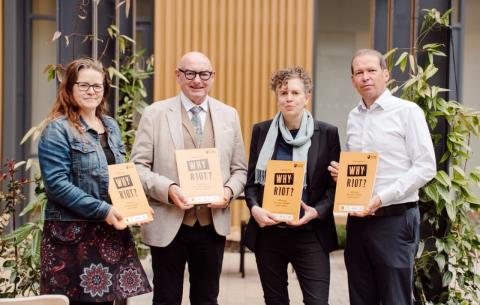Addressing Youth Needs and Fostering Critical Thinking are Key to Reducing Youth Violence New Report finds

A new report, “Learning from Why Riot? Addressing the ‘whys’ beneath youth violence” presents findings from an 18-month co-research project. It evidences how the OpenLearn course Why Riot? can be adapted as an effective community-based programme enabling marginalised young people to develop their skills as thinkers, peacebuilders and positive changemakers in contested spaces across Belfast, with policy implications beyond Northern Ireland.
This Open University (OU) report is based on a co-research collaboration with five local organisations working with at-risk young people in areas of contestation across Belfast:
· Education Authority East and North Belfast Area Projects
· Lagmore Youth Project, West Belfast
· St Peter’s Immaculata Youth Centre, West Belfast
· South Belfast Alternatives Restorative Justice
· Why Riot? course co-creator Dr William Mitchell (The ACT Initiative)
This research found that addressing young people’s needs and developing their skills of critical thinking and reflection through the Why Riot? programme, enabling them to make independent decisions and use their voice constructively for change, dramatically reduces youth violence, antisocial behaviour and self-destructive actions. The report identifies the corrosive social and structural issues behind youth violence and the value of co-developed solutions.
Originally co-created by The OU and The ACT Initiative, Why Riot? was adapted by youth workers into a youth programme for their local contexts. 60 young people aged 13 to 17 years participated from five Belfast locations, all in the top 10% most deprived in Northern Ireland. 70% of participants were boys. Most were detached from youth provision, and many struggled with or had disengaged from formal education.
All who completed the programme (67%) experienced positive change. This was evidenced through the Meaningful Change Framework - a tool co-developed with youth workers to evaluate outcomes in areas such as emotional safety, belonging, confidence in education and critical thinking. At the end of the study 4 out of 5 groups reported 100% reductions in their engagement in violence. Through Why Riot? youth workers demonstrated how long-term engagement responsive to youth needs, is personally transformative and can lay the ground for long-term peaceful change. Findings suggest the programme can be adapted for other contexts.
Youth participants reflected:
‘Why Riot? will help people understand their family, community and themselves. It helped me know myself better. It helped me not want to riot’
This report highlights the contribution marginalised young people can make to building a more peaceful future and the value of co-creation methods for developing ground up solutions, alongside joined-up policy responses to address social and structural inequalities underpinning youth violence.
Gabi Kent,
Senior Knowledge Exchange Lecturer
